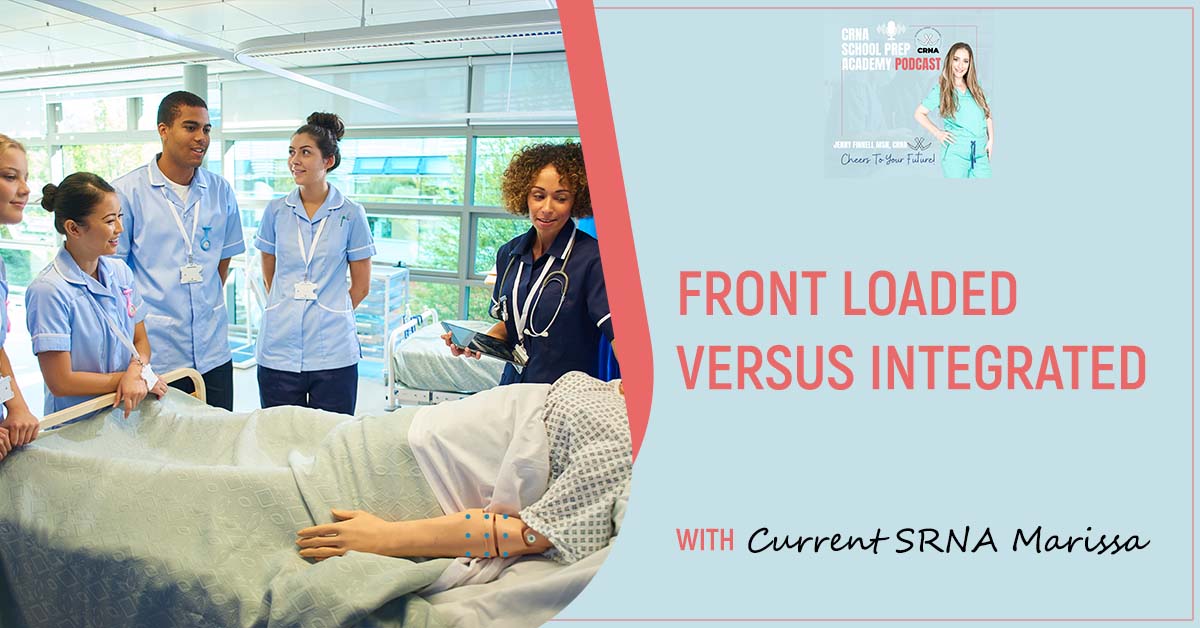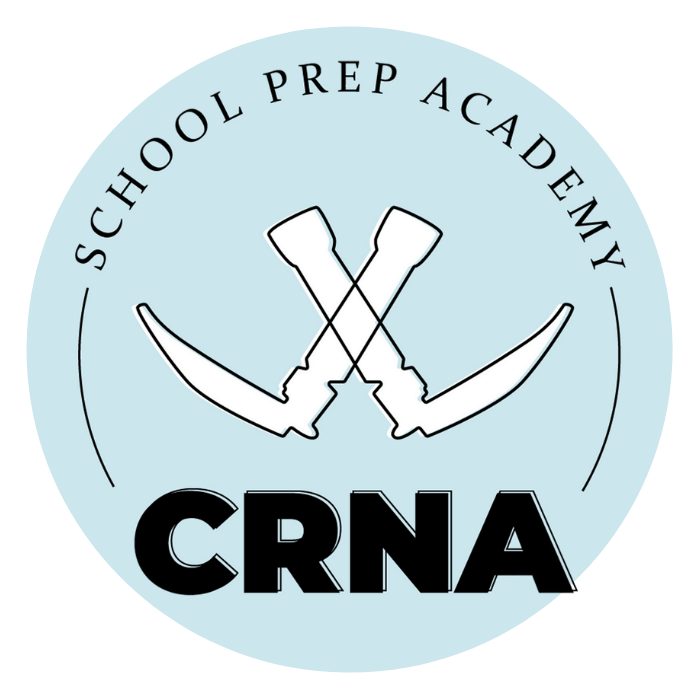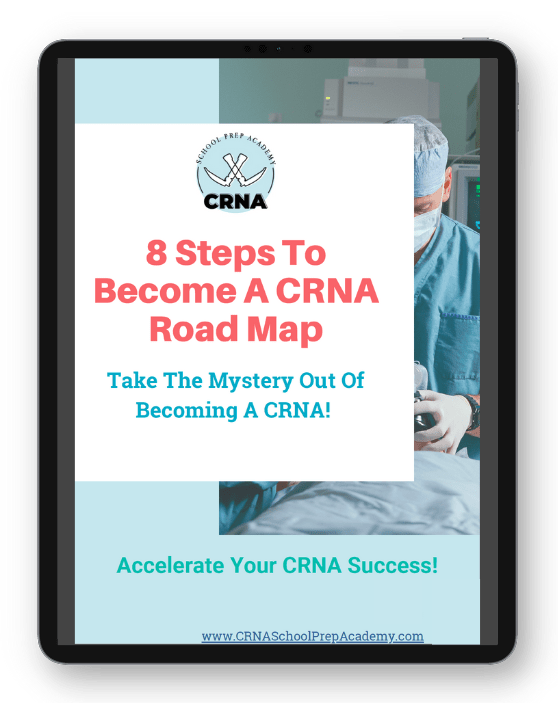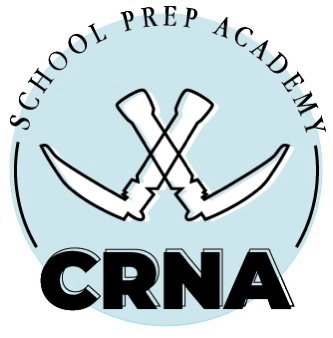
Should you choose a front-loaded program over an integrated program for your CRNA school experience? Choosing the path that is right for you can feel like an intimidating decision, especially when you’re not sure what to expect! As always, preparation is key, and we’ve got you covered!
In this episode, we are joined by current SRNA Marissa, who is in her second year inside a front-loaded program. Join us as she shares the details of her program experience while we cover:
What kind of course layout you can expect in front-loaded programs
Tips for effective studying when it comes time to hit the books
The ins and outs of clinical lab experience in a front-loaded program (+ preparedness for the OR)
The key ways your program will work to prepare you for boards ahead of time
An in-depth look at the time commitment and effort your program will take
How to gather the right information to help you make the best program choice for you, your current priorities, and your future CRNA career
Go grab a snack and settle in to learn more about which program sounds best for you! Happy listening, future CRNA!
Grab your copy of the Ultimate CRNA Resource Guide here! http://crnaschoolprepacademy.
Get access to planning tools, valuable CRNA Faculty guidance & mapped out courses that have been proven to accelerate your CRNA success! Become a member of CRNA School Prep Academy here:
https://www.crnaschoolprepacademy.com/join
Book a mock interview, resume edit or personal statement critique:
—
Watch the episode here
Listen to the podcast here
Front Loaded Versus Integrated With Current SRNA Marissa
We have a special guest episode. Marissa here is a current SRNA. I’m super excited to bring her on the show because I wanted her to share her experience being in a front-loaded program. I get asked a lot by students who are like, “Jenny, I got accepted to multiple schools. I don’t know how to pick between a front-load and an integrated program. What do I do?”
While I try to explain it, I’ve had one experience myself, which was integrated. I wanted to bring Marissa on to talk about it. She’s a current student, so obviously, my experience is getting old at this point but we’ll share our experiences with you. Marissa, if you wouldn’t mind telling everyone a little bit about your nursing background and how you chose CRNA.
My name is Marissa. I am in my second year of CRNA school now. I am doing a full-time clinical. As Jenny said, I am a front-loaded program. I finished all my didactic and am now in my clinical portion. I was working in the ICU for a few years before I applied and got into CRNA school. I knew I wanted to become a Nurse Anesthetist when I was thirteen years old on a medical mission trip with my parents. I fell in love with anesthesia even before I knew a whole lot about what that meant. From that point on, that’s been the goal until now. I worked in surgical, cardiac, neuro, trauma, and medical ICU. I had all of the ICU backgrounds going in, which was very helpful.
I didn’t know that. That’s cool. Out of curiosity, what do your parents do that took you on a mission trip?
My dad was Arche for fifteen years and was a pacemaker rep, so he worked in that regard. My mom has been a nurse for a few years. She works in GI, so she works with a bunch of CRNAs and endo.
Welcome and I’m excited to have you here. FYI, if you folks are sensitive, I am dealing with a little upper respiratory cold. If I sniffle or cough, I apologize from the get-go but I’m going to try my best. I’m going to let Marissa take the show here mostly. Bear with me. I hope I don’t cough. To start off, when you started your program, what would you say you started with your syllabus? What did you start doing? Was it DNP work? What anesthesia courses were you taking, if any, or was it all DNP work for people to get an idea?
Luckily for me, I am in one of the last master’s programs. I’m not in a DNP program. I know that’s going to look a little bit different but with front-loaded, we started with basic courses. We had Anatomy and Physiology, Biochem then we had a little sprinkle of basic anesthesia background stuff for my very first quarter. After those pre-recs, I got out of the way. The second quarter we did, we hit the books hard with all anesthesia nonstop.
I didn’t realize that but that’s good to know. In case you folks are wondering from the programs that I have talked to and discussed now, they’re all different. Take this with a grain of salt but from the programs I’ve discussed, most of the programs, will do a similar type of curriculum where they’re going to have a nursing theory course or some pathophysiology course along with introductory or introducing the DNP project course as well.
They do tend to try to blend the two but you start with Anatomy, Physiology, Biochemistry, and some intro to anesthesia. They have probably replaced some of that. Maybe a Biochem, for example. You would have a DNP course. They would still mix the two together a little bit from my personal experience. First, it was mostly general courses, then you went to more anesthesia courses. Was that for an entire year then that you spent doing this didactic work?
With the front-loaded programs, as I said before, we don’t have any clinical. It’s all book work like Sunday through Saturday. You’re busy twelve plus hours a day working on classwork, whether you’re in class or you’re out. You’re studying something regardless. It started to get heavy. It was heavy from the start but 2nd quarter to the 4th, it was all anesthesia. We would have a course that was strictly more anesthesia implications. Along with that course, we would have a Physiology that tied in with the subject of anesthesia.
For example, if we were in our cardiac section, our anesthesia course would be anesthesia care for a cardiac patient. In Physiology, we’d be learning pantropys of cardiac. Aside from that, we would also have our pharmacology class and we would be going into cardiac pharmacology. It was nice that everything was separate classes but they timed everything to where it was all conjoined by each system, so respiratory renal. That was helpful for how heavy it was. At least, if you were in one class, you were in a way studying for your other two, or at least trying to pull it all together.
The quote of CRNA school is that you're always behind. You're never going to go to bed thinking you did everything today. Click To TweetI don’t remember mine being like that. It would have been nice.
It’s so cool.
I was in an integrated program. Now granted, they are moving to DNP. I do know they’re staying integrated. However, it’s going to feel more front-loaded because of the DNP project. It’s going to take more time with less time in clinical essentially in the first year but they are still going to be in clinical the first year. It is going to still be considered integrated.
My experience was the first summer, semester, whatever you want to call it. It was the intro work and we ended up ending that semester with four observation days in the OR, just once a week, or the second semester, we started clinical. We barely even had one semester of anesthesia school before we were in clinical.
Again, it started off with maybe one day a week. By the end of that semester, we were two days a week then going into the third semester. We were 2 to 3 days a week, depending on our class schedule. By the end of that whole last year of my program, I was in clinical 4 days a week and only in class 1 day a week. I do remember there being times when I would have to learn cardiac. I was in my cardiac rotation but we would be learning pediatrics in class. Trying to study two specialties was insanely overwhelming and backed up a little bit as far as twelve-hour days.
Now mind you, twelve-hour days in the sense that you’re getting up usually around like 5:00 in the morning then usually by the time, you’re maybe eating dinner by 6:00 at night but you’re also still hitting the books again. It doesn’t mean that you’re going twelve straight hours of studying but that’s a whole day. That’s traveling to and from class. That’s taking a lunch break. That’s studying and reading in between and doing some assignments but you’re also getting some built-in breaks. Let’s talk about that. When you start off your didactics so heavy, how did you break that up, so you weren’t studying for twelve straight hours?
The correct answer from me was procrastination. I figured that out very quickly that needed to not be how I took my breaks. A lot of people, it’s even more likely but I was out of school for six years from nursing school. Coming back to school and not having been a student for six years is hard. I was one of those students in nursing school that hated studying. Like some people, they love school. They get super into it. They’re good at school and I’m somebody that’s just not. It takes a lot of focus for me and a lot of determination to be able to plan out my day. Other things are I’m a slow studier. I am super distracted by everything.
Unfortunately, for me, the days were a lot longer because it would take me three hours to get to know this certain “subject” that it took my friend who lives down the street one hour. It depends on how you study, too. The biggest thing is prioritization. There’s too much. You’re never going to go to bed ever thinking like, “I did everything today,” because, to me, that wasn’t the reality. Anyone I talked to would never say that. They would be like, “I tried. I’m always behind.” That seems to be the quote of CRNAs school, “I’m always behind.”.
I’m glad you said that because you’re right. It can feel that way, folks. For current students who are reading, you’re like, “Yes. Why?” First of all, know that you’re not alone. Second of all, it’s meant to feel this way. Let me put some perspective on this. You are learning. Learning effectively feels hard and feels like you’re not achieving anything because you don’t see instant results.

I promise you. The way they have designed this curriculum, it challenges you where you need to be to learn. I’m saying this because you will get to boards, then you’ll reflect back. You can finally have a big deep breath in. Now that I’ve officially done my last day in clinical. You look back and you’re like, “Holy freaking cow. How did I learn all this?”
You don’t even realize you’re doing it because it’s going to feel like you’re not learning it. You’re going to feel like, “I’m still struggling.” As you struggle, you learn effort equals learning. I stress this in my how to study effective lectures. Don’t get me wrong, as Marissa said, she found out pretty early on that she was a procrastinator, which was great that you identified that.
Secondly, she took steps to mediate that to make it more efficient for her. It doesn’t mean your experience as your classmates are going to be the same. No, it does not. Please do not say just because so-and-so can spend an hour doesn’t mean that you should spend an hour. You are all a little different and some subject matters are going to be easier for you and vice versa. Take the time that you need but recognize when you maybe need to change it up a little bit and try different strategies.
For sure, everyone is different. You can’t compare.
Let’s talk a little bit now about clinical lab experience. I know you started clinical. I’m questioning, did you feel ready from your clinical simulation experience to go into the OR?
No.
I love you’re honest, though, because I would tell you, I didn’t either from mine.
Anyone that says that they were should have an eye out on them a little bit. It’s not reality. We know that. Given a side note. We were fresh COVID when we started our lab time. We did get a little bit of lab time taken away because we weren’t able to be on campus for a couple of months but my school was great. They were able to make it up. They allowed us to book private lessons almost with our instructors. We had our big SIM lab. A group of 2 to 4 of us would book an instructor. They would have these SIM labs and they would do bradycardia from an X lab or something.
They do it on the vitals and that was good practice for us. In a lot of those scenarios, they didn’t come in any anesthesia ones that we should know how to take care of. It does help but with lab, I’m sure school requirements are probably pretty minimal. Our assigned lab hours were only two hours a week. Nobody is doing two hours like you’re living in there when you have time. It’s all about the time and the effort that you put into it when you’re in lab. The mannequins are there. The resources are there for you. It’s about if you want to commit that time to yourself and learn from it. That’s the more prepared that you’re going to be.
Whether you're integrated or front-loaded, you are going to have to go back and review things the night before. Click To TweetI remember our labs are more of a free for all like, “This is your designated time to use it but it was up to you to do it essentially.” We would have group discussions about different lab areas but then, from there, it was more like, “Now you go and do those things.” This is me a long time ago. I don’t remember running through scenarios. Maybe we did but I don’t remember feeling like lab ever prepared me for the real experience in the sense that, as you said, you know it’s not real and it’s hard.
Don’t get me wrong. I think you should do mock experiences but there is something to be said about the real thing. How did that feel for you since you had been out of the clinical world for about a year or year and a half prior to when you went back into clinical? How did you feel about making that transition?
I don’t think it was too difficult. Once you’re a nurse for a few years, you can’t take that from you. The weirdest part is that it’s in an environment that you’re not used to. No matter how many years of ICU experience or even if you have twenty years of ICU nursing experience, you’re not going back to the ICU. You’re going to an OR which is foreign to you. That was the thing. No matter how good I am at communicating with the patient in pre-op.
That wasn’t hard for me to get used to quickly because I’ve talked for years with patients. The setup of the OR then hooking the patient up to the monitors like that way, the flow and the different dynamics in the OR are all completely new to you. I didn’t notice a whole difference that year off of being in a hospital. I don’t think that would have played any part in how new the OR environment is if that makes sense.
I think that’s reassuring too for people who are afraid of that but it’s going to be new for everyone. It doesn’t matter how long. It’s just a different environment and tasks at hand. Different types of knowledge that you’re bringing forth versus your ICU days. Regardless of being out of the clinical realm, you’re still going to feel like a fish out of water at first.
More like what she said, she felt some things were a little bit easier, like pre-oping the patient because she was very comfortable talking to patients. Even though I felt comfortable talking to patients, I was terrified of sounding stupid. I remember bringing my little clipboard and being terrified. I was going to forget to ask them a pertinent question and have my preceptor be like, “Did you ask him this?” You would be like, “No,” then I would have to go back.
That still happens.
I have to go back and be like, “Can I do a second assessment?” Here’s the funny thing. It even happens after you’ve been a CRNA for a while. You’re like, “I forgot that one thing.” It’s no big deal. Go back and politely say, “I meant to ask you this question. Would you mind sharing this? I forgot to do the blood consent or whatever it is.”
It’s okay to forget and embrace the fact that it’s a new environment and not to worry about being rusty because you’re going to be. Give yourself some grace and know that it’s only going to get better. What did you find hard about learning all the information upfront before clinical? Have you found it necessary to refresh yourself on some knowledge, maybe now that you’re in clinical?

I think that’s what people bring up the most in regards to front-loaded programs of whether or not this is going to work for me. Is it not? It totally depends on the person but, at the same time, it’s going to be hard either way you go. It is super hard to learn everything upfront and not be able to see that clinically. You basically are memorizing a bunch of facts and trying to envision in your head how it’s played out in the OR when you’re studying for a didactic. You have no idea how that looks. Now that I’m in clinical, I’m like, “I remember learning that. That did matter. Here’s an application to it. They seem to know what they’re doing with this.”
It is having to go back. Regardless of the program, whether you’re integrated or front-loaded, you are going to hopefully, have to go back and review things the night before. There’s no way for you to memorize all that information, regardless of a front-loaded or integrated program. If I find out I’m doing a cardiac case, I’m biased towards cardiac because I worked for a cardiac long time. I’ll keep using that as an example but say I have a heart the next day. They have these comorbidities then, you should be looking up stuff that applies to anesthesia unless you’re brilliant and have all that in your head.
It’s too busy, you’re too tired and you had that lecture months ago. Even with people that I’ve talked with integrated programs. A lot of the time, they don’t match up, so if they did have that cardiac patient, maybe they haven’t had their cardiac lectures yet. That’s scheduled a month before, so that’s like scary. At the same time, you’re reviewing it anyways. Both programs have their ups and downs for sure but you’re reviewing the night before.
Marissa admitted some good points. I know for us, our first year of clinicals is all general rotations, meaning we didn’t do any until our last year. That’s because that’s when we hit the part of our anesthesia program where we learned pediatrics, cardiac, and OB. The problem was you never knew where your rotation was going to fall in cardiac.
For me, we learned cardiac after my cardiac rotation. I had to study on my own, learn it to the T without even addressing it in class, and get my questions answered. That was very hard. Did it stress me out? Heck, yes. It did. I relied heavily on students who came before me and asked for a lot of insights on who was at that clinical site, how to set up the room, and what they like.
Use your upperclassmen to pick their brain or even students who have been through the rotation before because I was not the only one that had that experience. There’s something to be said. As Marissa said, it doesn’t matter whether you’re front-loaded or integrated. You will always have to review the material. I’m glad you said that. Let’s talk about board prep because, at least for me, when I started, I started board prep within the first semester of school. Has that been your experience too?
With each lecture, they will always hit on the points like, “This is a classic board type topic.” The good thing about my school, and I think this is all schools, is their tests are very much focused on how boards like to ask their questions. They were very repetitive. We would throw in cumulative at the end of quarters and stuff like that to hit hard on topics that are very common on boards.
Now, with us doing straight clinical, you’re exhausted. I got up at 3:45 for this last rotation because I had an hour commute. I’m driving for an hour. I’m at clinical for 12-ish. Maybe sometimes more plus an hour drive home. The last thing I want to do is, on my own time, casually browse board questions. Luckily, for me, my school assigns those APEX workbooks, which hold us accountable for studying for boards. We have one of those APEX workbooks due every week with the proctored exam on a Sunday. It’s busy. Would I be doing that and holding myself accountable if my school wasn’t making me do that? No.
That’s why I also want to remind you folks who are stressing out front-loaded and integrated. There’s a built-in review, which is board prep. Even if you worry about going back to all your old notes, don’t get me wrong, you will but most schools built in some board preparation, which essentially is your way to review material because they do categorize board prep in specialty areas and different things like that. As Marissa said, she’s held accountable.
Before you start school, ask about your rent or housing situation. Is that going to be covered or are you completely on your own? Click To TweetI don’t remember being held accountable for board prep. They probably should have because I don’t think everyone did it. I remember getting behind occasionally. You said you’re a procrastinator. I have a sister who’s like that and I love her to death. She’s my best friend. I’m the opposite of that. Meaning I get so much anxiety when something is looming over me that I get it done. It could be a month ahead of time and I’m like, “Yes, it’s done.” I can’t stop. I won’t sleep and eat until something is done because I’m in it. That’s obviously not good. That’s a problem.
Either way, bad, totally type-A, can’t lose, and let go. They’re good and bad for their own reasons. I remember sticking up with my board prep because that was what was assigned to us but we weren’t held accountable for doing it. For a long time, what I did at the very end of my schooling was I took boards in nine days because I was like, “I’ve already done this three times. I should be ready by now. I never slacked off.” Don’t worry too much because schools want you to pass.
They want you to be good and ready. Ultimately, what I wanted to point out was you’re going to have some review built into your schooling anyways. Let’s talk a little bit about traveling for clinical. I know you mentioned you’d go an hour there and an hour back. That’s a lot. 3:45 is early. Are you going there at 4:45? Is it a heart rotation? What rotation is it?
No, it’s just everything. I like to get there an hour and a half early. If I’m up at 3:45, by the time I leave the house, it’s 4:30. I get there at 5:30 for a case that’s 7:00 AM. I’m not too crazy.
That’s so early. I remember getting up at 4:00 in the morning for my clinical days but I think the furthest drive I had was about an hour but they didn’t start until 8:00. That was helpful.
It depends on where you’re at but that’s the longest commute. That one, I finished up. That was my last day at that rotation. My next rotation is only a 30-minute commute, which is great. Here in my hometown and in regards to travel, as you said, every school is so different. When you’re looking at applying for schools or you got into a school and made sure that you have all that information before you start because it is a huge undertaking. It affects your entire life. I calculated it because somebody asked me on Instagram that 40% of my class has kids. If you folks have kids, you have to have a serious conversation with your significant other like, “How is this going to look?”
One of my best friends in the program is going to have to move to Texas in about a week. She has a 2-year-old and a 3-year-old. She’s going to have to leave her kids here because it’s not realistic for her husband to quit his job. Depending on the school, some people have rotations for only a month that you’re traveling or they are three months each. It is a short time span that you’re not going to pick up your family, find an apartment, or try and rent out the house that you already have.
It’s something to take into consideration that you can’t pick up your family and pop them around. Some people do like one other good friend I have. She has four kids. Her husband is the one that watches the kids. He had to quit his job to support her and the family during CRNA school, which is also something that people need to have conversations about because somebody has got to take care of those kids. It’s hard.
For her, she’s somebody that decided to take her family with her with each rotation. Even so, you’re like, “The family is going to be together.” You’re still probably going to be gone for at least twelve hours out of that day, you’re coming back, you have to do your board prep, and then you’re going to bed. Luckily, as I said, my rotations are three months each.

At least we have time to get used to the facility. We get to know people. Whereas, I worked with a couple of CRNAs during this last rotation and they had one month-long rotation travels. I’m like, “Holy crap. That’s hard.” Maybe some people like that but at the same time, you’re trying to figure out which hallway is the right hallway then you move to your next rotation.
One more thing to throw on and something that you should ask schools about is your rent or housing. Is that going to be covered? Is that going to be helped by our school or you’re completely on your own? My school has nothing to do with it. It’s all us. We did an Airbnb. Me and two other girls at a couple of rotations down the road.
That’s what a lot of people do. They will get an Airbnb or a long-term rental for three months. Other people like the girls that I worked with at this last rotation; their school provided the housing. It is something to keep in mind and add to your financial planning when you’re applying and deciding between schools because it does add up for sure.
The added stress too of figuring it out yourself, I think that’s a lot to be said. All your spare time after your twelve-hour day. I know I’ve helped a lot of students who come to our hospital from say Arizona or even California, who reached out to me because they know me. They figure out where I work and I’m trying to help them find housing.
Some of the CRNAs I work with do have houses. They rent out to students, which is nice. Even some of the docs do as well. A lot of them do Airbnbs or extended stays in hotels or condo places. When schools make it, you don’t have to worry about these things. You pay for it but it’s in your tuition. It’s not free but it’s at least covering your tuition expenses, which is nice. Also, less of the burden of trying to figure it out yourself.
For me, trying to come to an inner-city, which is where most hospitals are, and trying to find a place that’s close by but safe is another thing too. I have people reach out to me like, “Jenny, is this area safe?” I’m like, “No, don’t go there.” I had one student say, “Jenny, if I stay here, can I walk to the hospital?” I’m like, “No. This is the inner city. No, don’t walk to the hospital please.” It’s a five-minute drive but it’s worth the cost of parking to ensure your safety. It is something to think about. As far as bringing your family along, Marissa is right. You’re not that present anyways with the commitment you’re making.
Is it worth upbringing? Again, this is all a personal choice. I’m not nay-saying if that’s what you choose to do. If you have the flexibility and can afford it, then by all means. Trust me, I’m a mom. It would break my heart to think that I couldn’t kiss my kids goodnight. Honestly, thinking about that makes me want to cry. I can’t even imagine. My heart is with you. If that is you and you’re like, “What am I going to do?” It’s so heartbreaking. I have had students in the clinic with me fight back the tears and talk about their families. I don’t mean to bring it up as a sore spot but I just know. They’re like, “I haven’t seen my kids in two months.” It hurts even to hear it.
I feel for you if that’s what you were getting ready to go through but what I can reassure you is it’s not going to change how your kids feel about you. They’re going to love you. You’re still mama. You’re going to come home and be super excited. You’re still daddy. Men and women go both ways. Hang in there. Hang tight. The payoff will be so worth it. It’s going to be harder on you than it is for the children. I can tell you that.
I think so because the kids are so oblivious. As long as they’re loved and they have what they need, they’re happy. You can FaceTime these days, as long as they understand. I also have some parents telling me, like, “If you include your family and your kids with what you’re doing, saying like, ‘When mommy’s done or when daddy’s done with school, we’ll take a family vacation to Disney or something,’ that’ll be our card.”
The thing that you back away from the most is what you're the least familiar with.” Click To TweetThey’re excited for you to finish too because they know they have a reward at the end as well. It’s something fun to do. Onto the next question, I wanted to ask you. You were talking about traveling for maybe a month at a time. I also want to point that out too, because I had that experience. Where a few months of specialty rotations were for a month and it was traveling. I had to stay in their resident call room. That was scary. It had bed bugs. I ended up staying with my other clinical buddy rotation on a couch instead. It was late for my open-heart rotation. I’ve probably told this story before. I’m sorry if you’re hearing it for a second time.
I was on my open-heart rotation. Obviously, I was terrified. My first day of doing hearts. I never worked cardiac as an ICU nurse. I worked medical ICU. Before we learned cardiac, I had to do all my own studying. I worked so hard to go to that first rotation. I would get out of town, unfortunately, late at night. We should have left earlier but it was a three-hour drive.
We drove in. It was 8:00 at night. The hospital is on lockdown for a stabbing, which we didn’t know about. We just knew that the hospitals were locked down. We’re like, “Why can’t we get in? We’re sitting on a high. Why are the doors locked?” Long story short, we commuted because we were poor. We wanted to save money, so we both drove together. She was staying at a hospital, maybe twenty minutes down the road. Anyways, I finally got to my room and I started getting unpacked. I pull back the sheets and I see a little bug.
I looked under the mattress and I saw more bugs crawl into the mattress. I’m like, “Oh my God.” At that point, I call her. It was 9:00 night. Again, as I said, the whole hospital stabbing area was locked down. I was like, “Don’t worry about it. Don’t come back and get me. I’ll survive.” I obviously have to be here the next morning for my clinical day. I sat up all night long, watched, looked around me and tried to study more. I’m thinking, “I’ll just study. I’ll step on it and study.” My eyes were bloodshot.
I got dressed in my scrubs for the next day, sat in the chair, looked around, and made sure I didn’t have any bugs crawling on me. I obviously told people about the bug problem the next day. They’re like, “Thank you for letting us know.” I remember looking like, “They’re going to think I’m a druggie.” I’m showing up like my eyes are inflamed and red but I got through it. I went and stayed at the other hospital.
We split hearts with other hospitals, so it is what it is. As you said, for a month’s time, you don’t necessarily even get acclimated to not only the staff but where things are at. It can be high stress when you’re rotating a lot. What would you say is your favorite part of anesthesia so far? What’s your favorite case? I’m curious.
I like it a lot. I like cardiac because that’s comfortable to me, even though there’s a whole lot more that I have to learn in that regard. I like ortho. I liked doing the spinal and the blocks in pretty straightforward cases. I surprise myself. I like OB. I did not expect to like OB at all. I enjoy the C-sections and epidurals. It seemed fun. I’ve had little experience with all the specialties. I like it a whole lot more than I expected, so that’s good.
What about endo? Since your mom is endo.
I don’t hate endo. I know a lot of people are like, “No. It’s busy and it’s high turnover. It’s a lot of charting. It’s a lot of organizing your time with all the different patients.” I don’t hate it but every time I talk to my mom about it, she’s like, “We’re so nice to all the CRNAs. I don’t know why everybody hates us.” I’m like, “It’s not you guys. It’s a lot of work.”

A lot of them are usually open airways through LMAs. They don’t numb the vocal cords, then they cough, your LMA, and spasm. They’re on this left lateral position that’s halfway on their stomach. They’re leaking bile out of their mouth. It can be not super fun from the anesthesia side of things. That was funny. I had to ask it. That’s interesting. OB can be a beautiful, amazing experience. For me, I had a love baby. It was one of the most beautiful, amazing, rewarding things and I love babies. If I was ten years younger, I would have way more babies.
I love seeing babies being born but sometimes, it can be sad and terrifying in a hot freaking second. You have to be on your toes. It’s two lives. You’re always caring for mom but telling mom baby’s getting chest compressions and we’ll update them. It can be a very sad, scary thing too. We need people who want to do OB because OB, for me too, is a lot of PR. PR, in a sense, it’s like patient satisfaction PR. They’re not in the Ritz Carlton but they’re having a baby. That’s something exciting and they’re looking forward to doing it. They prep for nine months. They’re like, “Sweet. This is going to be an amazing experience.”
Sometimes, it’s not always an amazing experience for them. A lot of it is making them as comfortable as possible. Reassuring them because they’re scared, I did a lot of handholding in OB. I would play my spa music for mom. I would talk her down. I would do a lot of things that I could to alleviate her. If she needed it, I would give her medicine too. It became a lot of trying to get that experience such that they can walk away with good memories but you can only do the best that you can with that sometimes. Good for you. Cardiac is so much fun. I love cardiac. It’s funny. Now that I work with kids though, I don’t want to do pediatric cardiac.
With adult cardiac, I love seeing a beating heart. I don’t like seeing brains and ortho because it’s gross. It seems barbaric with all the hammering and banging and blood flying everywhere. That chunk is so gross. In the heart, you can take the blood to someone’s body, put it through a machine, and put it back in the body. You operate on the heart while they’re asleep. It’s the coolest thing in the world to watch it stop beating and come back beating. It’s so cool. That’s exciting that you love that. Embrace it.
I wanted to do cardiac. I questioned whether I could because I had a crummy rotation in school but it always fascinated me. I made a point to put the birdie out there when I started. I was like, “I would like to join in the cardiac team someday.” I’m thinking it would be years down the road. Within the first six months, I had several other series like, “Are you ready?” I’m like, “Now?” They’re like, “Now. Join the 24-hour team and come work with the new hearts.” I’m like, “Are you sure you want me? I just graduated.” They’re like, “You’ll be ready. You’ll hit the ground running,” and you do hit the ground running but that’s fun. What would you say is your least favorite?
It’s not endo. It would be peds and that’s only because I don’t have enough experience with it. I have only had two weeks so far. It was the most foreign to me and that’s why I don’t like it right now. I know I’m going to get a bunch more peds at my next rotation and the one following. The thing that you back away from the most is what you’re the least familiar with. Pediatric dosing and all the differences there is something that you have to know. Having that very quickly in the back of your mind, all the pediatric dosing, pediatric emergencies, and very different physiology, respiratory wise and being able to make some decisions very quickly based off of that.
They’re not little adults, that’s for sure. They’re so cute.
I think I started getting into it at the end of the second week but now, I’m thinking about it again. I’m like, “No.” All that knowledge is gone. You need repetition done. I don’t feel comfortable again.
I can speak from being a CRNA for years. When I made a choice to go to all pediatric hospitals, I was scared because I was like, “Jenny, do I want this?” I even told the manager, I go, “I’m not 100% willing to commit to this full-time because I don’t know if I’m going to like it,” but I do. I love it there. Is it scary? Yes. Having a one-kilo baby or less could be terrifying. It is more scary than adults, I will say. The dosing accuracy has to be on point. With adults, you can get away with a lot more. It is like a little reservoir tank period.

If you miss dose like neostigmine, for example, with kids. Now they’re weak and they have the effects of bradycardia, which could be bad for kids. They’re dependent on their cardiac output from heart rate. Depending on the age, now, don’t get me wrong. Twelve or thirteen-year-old are little adults for the most part but little babies are their own little person. I get that. I remember feeling scared in school, itwas one of my most stressful rotations as well. We had three months in peds. That’s what I ended up with in school. It’s funny because I ended with hearts, OB, and peds. I had not intubated any in adult.
At the time I ended my specialties and I graduated, I started working for 8 to 9 months. In my first days as a CRNA, I’m like, “Please give me a baby.” It didn’t happen but it’s fine. You pick it back up. It does become muscle memory. Don’t worry if that happens to you. You will remember how to intubate. It will come back to you quickly. Being on point with your dosing for peds, understand the physiology process, and knowing that you have resources. I calculate drugs. I don’t care if I think I know the dose. I always do my calculations and there’s the resource. I use Vargo all the time to look things up. I do ask questions a lot.
I asked my coworkers questions like, “How would you do this case? I’ve never done this before.” Even if I think I should know what I do. I still ask because why not? I encourage you, folks. If that’s you or you’re scared to do something like that, know that you’re never going to be alone. You’re always going to have resources. For me, picking what I liked became about the job environment. You want to look at what you do but I could do ortho all day, even though I don’t like ortho if the job environment was good.
Same with neuro. I don’t like neuro but if I found a great place to work that did all neuro, I’d embrace it. Marissa, this has been fun. Is there anything you would like to add? If someone has 3 or 4 schools to pick, maybe they’re worried about being front-loaded versus integrated or anything for that matter. What advice would you give them as far as how to decide?
Overall, I think you know deep down how both of these programs will work for you. One of my best friends who’s in a different program talked about it several times. We both are like, “I don’t know how I would be able to do your program.” She loves the integrated. It’s worked for her. It’s had some difficulties that we’ve talked about already with things not matching up but she’s also said, “I don’t know how you don’t have any clinical application to what you’re learning until a year.”
Either way, there’s no perfect school that’s going to check all of your boxes and you’re going to be like, “This is catered to me.” CRNA school is all about flexibility and you’re going to have to give up a few things to take home what you need most out of school. I think deep down, you probably already know what program is going to work for you. If you’re still on the fence, try and talk to whomever you can.
If you know anyone in that program, reach out. I have a lot of people reach out to me and ask me questions about my program. Try and use your resources and know how you study like what we mentioned before. Whether that application is going to work for you with integrated programs or you’re more comfortable with getting it all done, then your tests are over with and you have to do a lot more refreshing the night before for everything.
All great points. I do agree that one of the benefits of integrated is the fact that you get the application piece from clinical, but Marissa is right. No school is going to check all your boxes. It’s not out there but what I will want to leave you, folks, with is you are in control of what you decide to do with your practice. If you got a crappy regional experience, go do it as a CRNA. What’s stopping you? You. You would be the only one stopping you from doing it just because you got a bad rotation. I had a terrible cardiac irritation. Do you know how many hearts I got? Five and one of them was an observation. I think I needed five hearts to take boards but I’ve done hundreds of hearts now as a CRNA and that six months post-graduation nonetheless.
Same with my OB. I had five cardiac epidurals. I did a lot of thoracic epidurals as a CNRA but like labor epidurals. I only had five, which was the minimum. I had a terrible OB rotation too. I did tons of spinal. I never seemed to get out of the OR to go do an epidural. They kept me in the OR to do a spinal all day, which was unfortunate. I joined the open-heart team and did a 24-hour call. I did a lot of OB. Did it feel like a fish out of water and awkward? Yes but I learned. You embrace what you want your practice to be. Don’t let your experience in school deter you from chasing what you want in practice. Whether that’s an independent practice or a practice that does a lot of regional, go get it.
Go get it and own what you do with your career. You are capable of learning. Most jobs are willing to train you on the job. Don’t think because you didn’t get it in school means you’re not going to be qualified to do it as a CRNA. You’ll never know unless you try. One thing that Marissa said is to talk to current students. This is going to be the best way to know if you’re making the right choice. Are you satisfied? That’s what I would ask a current CRNA. Are you happy? It might not be perfect. No one expects perfection. It doesn’t exist, first of all. I don’t believe in perfection.
Are you happy with your education and the way you’re spending your money? If the answer is yes, let the rest go. I’ll leave you folks with that now. Marissa, thank you so much for joining us. This has been a lot of fun and I hope very insightful for you. Tune in to the next episode and don’t forget to go ahead and leave me a review. I love hearing from you folks. Thank you so much. We’ll see you soon. All right, bye. Bye, Marissa. Thank you.
Bye.
Important Links
- Free! Ultimate Resource Guide: http://CRNASchoolPrepAcademy.com/guide
Get access to planning tools, valuable CRNA Faculty guidance & mapped out courses that have been proven to accelerate your CRNA success! Become a member of CRNA School Prep Academy here:
https://www.crnaschoolprepacademy.com/join
Book a mock interview, resume edit or personal statement critique:
Join the CSPA email list: https://www.cspaedu.com/podcast-email
Send Jenny an email or make a podcast request!


